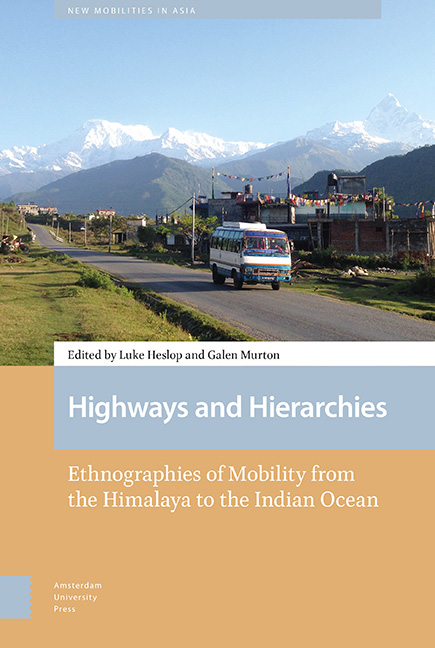Book contents
- Frontmatter
- Contents
- List of figures
- Acknowledgements
- Preface: Thinking with roads
- 1 Why highways remake hierarchies
- 2 Stuck on the side of the road: Mobility, marginality, and neoliberal governmentality in Nepal
- 3 A road to the ‘hidden place’: Road building and state formation in Medog, Tibet
- 4 Dhabas, highways, and exclusion
- 5 The edge of Kaladan: A ‘spectacular’ road through ‘nowhere’ on the India-Myanmar borderlands
- 6 The making of a ‘new Dubai’: Infrastructural rhetoric and development in Pakistan
- 7 Encountering Chinese development in the Maldives: Gifts, hospitality, and rumours
- 8 Roads and the politics of thought: Climate in India, democracy in Nepal
- Authors notes
- Index
Preface: Thinking with roads
Published online by Cambridge University Press: 13 November 2021
- Frontmatter
- Contents
- List of figures
- Acknowledgements
- Preface: Thinking with roads
- 1 Why highways remake hierarchies
- 2 Stuck on the side of the road: Mobility, marginality, and neoliberal governmentality in Nepal
- 3 A road to the ‘hidden place’: Road building and state formation in Medog, Tibet
- 4 Dhabas, highways, and exclusion
- 5 The edge of Kaladan: A ‘spectacular’ road through ‘nowhere’ on the India-Myanmar borderlands
- 6 The making of a ‘new Dubai’: Infrastructural rhetoric and development in Pakistan
- 7 Encountering Chinese development in the Maldives: Gifts, hospitality, and rumours
- 8 Roads and the politics of thought: Climate in India, democracy in Nepal
- Authors notes
- Index
Summary
The anthropology of roads has flourished in recent years in tandem with the expansion of road-construction projects across the planet. Confronted by the ways in which road-construction and infrastructural investments appear as instruments of economic growth, ethnographers have begun to pay close attention to diverse modes and scales of alignment that play out in specific times and places. Ethnographic research, such as is exemplified in the chapters collected here, challenges the assumptions of linear alignment and of enhanced prosperity. Looking in detail at how such large-scale infrastructure projects land in people's lives raises questions about the many different modes of engagement that emerge across the diverse scales that roads articulate.
The chapters gathered in the Highways and Hierarchies collection attend to the grounded effects of major road-building projects such as the Chinese state Belt and Road Initiative (BRI), designed to promote and support infrastructural development in countries right across Asia and Eastern Europe. The mega-investments of the BRI build on the symbolism of ancient trade routes. They are promoted by the Chinese state as a gift to the region, motivated by the desire to enhance regional connectivity through the facilitation of economic exchange and the promise of economic growth. China has a unique capacity to fund infrastructural initiatives at this scale, and the source of economic possibility is also always a source of political concern. In particular, the BRI is a challenge to India's interests and influence in the region. As terrestrial trade corridors are opened up through Bangladesh, Myanmar, Pakistan and Nepal, and maritime trade facilitated by the enhancement of the ports of the Maldives and Sri Lanka, the geopolitics of global circulation across both land and sea are reshaped. Borderlands are especially sensitive as physical and political proximities shift with the arrival of new and faster access routes to marginal areas and disputed territories. In these circumstances, roads appear as ambiguous and problematic gifts, technologies of development for some, of diplomatic provocation and asymmetrical integration for others. Either way, they impact on the lives of local people across the region who find themselves inextricably entangled in the materialities and the imaginaries of global expansion.
- Type
- Chapter
- Information
- Highways and HierarchiesEthnographies of Mobility from the Himalaya to the Indian Ocean, pp. 9 - 20Publisher: Amsterdam University PressPrint publication year: 2021

